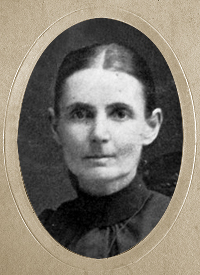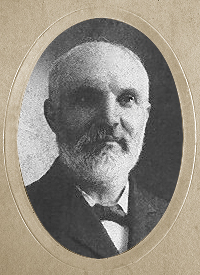Satisfied
BIBLE REFERENCE:
For he satisfieth the longing soul, and filleth the hungry soul with goodness.
Psalms 107:9
Bless the LORD, O my soul, and forget not all his benefits: Who forgiveth all thine
iniquities; who healeth all thy diseases; Who redeemeth thy life from destruction;
who crowneth thee with lovingkindness and tender mercies; Who satisfieth thy
mouth with good things; so that thy youth is renewed like the eagle's.
Psalms 103:2-5
And the LORD shall guide thee continually, and satisfy thy soul in drought, and make fat
thy bones: and thou shalt be like a watered garden, and like a spring of water, whose waters fail not.
Isaiah 58:11
Delight thyself also in the LORD; and he shall give thee the desires of thine heart.
Psalms 37:4
Clara Tear Williams -
Lyrics
1858-1937
Born: September 22, 1858, near Painesville Lake, Ohio.
Died: July 1, 1937, Houghton, New York.
Buried: Houghton, New York.
Ralph Erskine Hudson -
Composer
1843-1901
Born: September 22, 1858, near Painesville Lake, Ohio.
Died: July 1, 1937, Houghton, New York.
Buried: Houghton, New York.
HYMN HISTORY:
The author, Clara Tear Williams, has given the following description of the writing of this inspirational testimony hymn:
About 1875, I was helping in meetings in Troy, Ohio, where Professor R. E. Hudson conducted the singing,
when, just before retiring one night, he asked me to write a song for a book he was preparing to publish. Before sleeping, I wrote “Satisfied.” In the
morning, he composed the music.
In his book,
Songs That Lift the Heart,
George Beverly Shea gives
the following account regarding the author of this hymn:
My father, the Reverend A. J. Shea, and I were on an afternoon
shopping trip for Mother, as I recall. When we came out of a store in Houghton, New York, where we had recently moved from
Winchester, Ontario, we met a tall, elderly woman making her way slowly up the street. She was walking in that slow, mincing step older people sometimes do, cautious not to lose balance.
Dad tipped his hat and said good-day to her as we passed. She stopped and looked up to see who was speaking. Smiling sweetly, she returned his greeting.
“Do you know who that was, son?” he asked me on up the way. I turned and watched as she continued her careful progress. Though a distinguished woman (whom I
would now describe as looking a lot like Whistler’s Mother)– I had no idea who she was.
“That,” said Dad, “was Mrs. Clara Tear Williams. She writes hymns.” There was a near reverence in his voice, and though I was only eight years old, I was duly impressed.
Already, I was fascinated by music and anyone who was involved in it...
When Dad and I got home that afternoon, I told Mother about the meeting Mrs. Williams, the hymnwriter. She smiled knowingly and nodded he head. Then she went to the piano
bench and found a hymnal that contained one of Clara Tear Williams’ compositions.
She explained that Mrs. Williams–a Wesleyan Methodist like us–had written the words, but that the music had been written by Ralph E. Hudson, an Ohio publisher who also was
an evangelistic singer.
A few years later, when I was in my teens and began to sing solos, I memorized the hymn that Mother played that day and sang it
. It
was called “Satisfied.”
The composer of this hymn was Mr. Ralph E. Hudson, who was born on July 12, 1843, in Napoleon, Ohio.
Ralph moved to Pennsylvania with his parents Henry and Sarah Hudson when was a boy. Soon after the out break of the American civil war, Ralph enlisted in
the Army with 10th Pennsylvania Volunteers. He served his country for three years.
After discharge from the army, he became a successful music teacher. From 1872-1874, he was a Professor of Vocal Music at Mount Union College, and for the next twenty five
years lived in Mt. Union-Alliance, Ohio. Ralph formed a real estate partnership with Rev. D. D. Waugh for a few years. After trying that for a while he started to write and
publish hymns, he was also a lay preacher and a member of the Mt. Union Methodist Episcopal Church, and was a supporter of the Salvation Army when it struggled to gain a foot
hold in Alliance in the mid-1880’s.
Hudson moved to Cleveland, Ohio in 1897 where he continued to publish music and to travel as an evangelist. In late May 1901 he left Cleveland for an extensive trip to promote
his latest song book. He stopped in Upland, Indiana, to attend commencement exercises at Taylor University, where he was a trustee. He stayed there several days and delivered
a lecture. Shortly after, he fell gravely ill and died.
Ralph Hudson wrote and published other popular hymns that include: “Blessed Be the Name,” “At the Cross,” “A Glorious Church,” and “‘I’ll Live for Him”
Dear Brothers and Sisters in Christ,
The following is part of a Sermon delivered by Charles Spurgeon:
"Delight thyself also in the Lord." --Psalm 37:4
The teaching of these words must seem very surprising to those who are strangers to vital godliness, but to the sincere believer it is only the inculcation of a recognized truth.
The life of the believer is here described as a delight in God, and we are thus certified of the great fact that true religion overflows with happiness and joy. Ungodly persons and
mere professors never look upon religion as a joyful thing; to them it is service, duty, or necessity, but never pleasure or delight. If they attend to religion at all, it is either
that they may gain thereby, or else because they dare not do otherwise. The thought of delight in religion is so strange to most men, that no two words in their language stand further
apart than "holiness" and "delight." But believers who know Christ, understand that delight and faith are so blessedly united, that the gates of hell cannot prevail to separate them.
They who love God with all their hearts, find that His ways are ways of pleasantness, and all His paths are peace. Such joys, such brimful delights, such overflowing blessednesses,
do the saints discover in their Lord, that so far from serving Him from custom, they would follow Him though all the world cast out His name as evil. We fear not God because of any
compulsion; our faith is no fetter, our profession is no bondage, we are not dragged to holiness, nor driven to duty. No, our piety is our pleasure, our hope is our happiness,
our duty is our delight.
Delight and true religion are as allied as root and flower; as indivisible as truth and certainty; they are, in fact, two precious jewels glittering side by side in a setting of gold.
"'Tis when we taste Thy love,
Our joys divinely grow,
Unspeakable like those above,
And heaven begins below."
A Hymn and its History is a ministry that depends solely upon the Lord for his guidance, it is
distributed free as a ministry of HymnalAccompanist.com. Please help us to continue to
touch lives and bring blessings to many others 24 hours a day all over the world.
If you have been blessed by this Ministry please give a donation as the Lord
lays it upon your heart, and share in the Blessings. By investing in the
lives of others you will reap benefits that will last for all eternity.
|
Please pray about helping us to continue to minister to the body of Christ
You can make a secure donation online by clicking on the donation button
_______________________________________________________________________________________________
_______________________________________________________________________________________________
_______________________________________________________________________________________________
_______________________________________________________________________________________________
_______________________________________________________________________________________________




